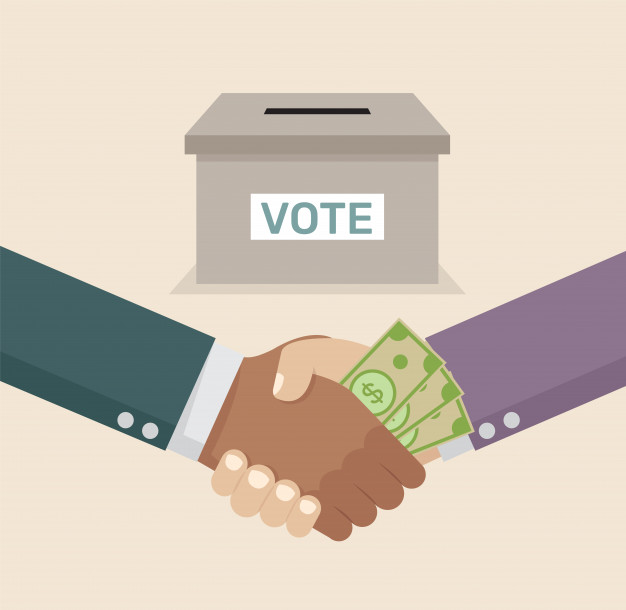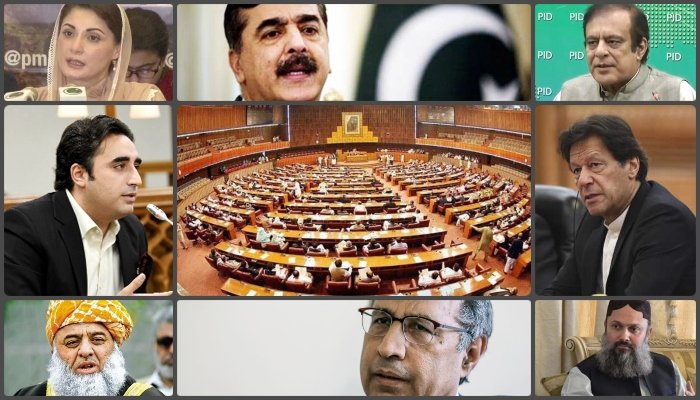Pakistan’s democracy has been shaken again by the Senate elections. A majority is important for the ruling government coalition because laws passed by the National Assembly (NA) have to be approved by the Senate as well. Controlled by the opposition till now the Senate was preventing this, severely impairing the political effectiveness of the govt.
Many years of “horse trading” in Senate elections has shown that secret voting promotes corruption and bags with cash change hands before the vote taking place. Ethical flaw aside it is also impairing the principle of proportionality in the Senate because party members of one party vote for another party and so the relative strength of the parties in the NA is not mirrored in the Upper House. The insistence of the Election Commission of Pakistan (ECP) to stick to the provisions of the 1973 Constitution for a secret ballot despite pledges by PPP and PML (N) in the ‘Charter of Democracy’ caused the usual corrupt practices to be repeated in the Islamabad open seat that was won by Yousuf Raza Gilani getting 48 votes against Abdul Hafeez Shaikh’s 44.
The subsequent election of the Senate Chairman exposed PDM’s machinations of vote buying during the Senate elections. As the Presiding Officer for the Senate election Senator Muzaffar Hussain Shah rejected seven votes, these were not stamped as required inside the box against of the candidate’s name but on the candidate’s name. Repeated verdicts of the Supreme Court (SC) expressed that the condition for a valid vote was the intention of the voter be clearly expressed on the ballot paper. In the subsequent voting for the Deputy Chairman PTI’s Afridi got 54 votes against the PDM candidate Maulana Haideri 44. The PDM vote remained unchanged, thus undercutting their claims of majority, seriously undermining ECP’s creditability and that of its Chairman in calling it a “fair election”.
Elections have been the usual mechanism by which modern representative democracy has operated since the 17th century in Europe. The idea of election not being indigenous to the subcontinent was introduced here by the British colonial power after the mutiny of 1857 as a means to perpetuate their rule in the subcontinent. Pakistan in 1947 accepted democracy as the most ‘progressive’ means to rule the modern State it intended to become. The repeated delay in and manipulation of general elections resulting in multiple military take-overs has shown that becoming ‘modern’ and ‘progressive’ is a difficult thing in a society that is strongly divided and has not had time to develop the democratic mind set based on equality needed for democracy. Consecutive Constitutions developed by the feudal and tribal and religious leaders sitting in the National Assemblies (NA) were more interested in staying in power than how to represent the needs of the population of Pakistan which is mainly poor and uneducated. But though change is slow, things are changing.

40 years since 1973, Pakistan must reform the electoral system proven to be counterproductive to the requirements of our time. We need a more effective representation of the different parts of our population and more credit-ability. One pioneer for electoral reforms the Jamaat-i-Islami (JI) with their demand for “Proportional Representation” since the 1970s that would override the strict ‘winner takes it all’ principle and allow smaller parties to be represented. To quote my article “Reforming Pakistan’s Electoral System” dated Sep 11, 2014, “The Supreme Court (SC) ruled in June 2012 in the Workers Party Case that the British model FPTP system violated the principle of majority (citing over 40% of races in the 2008 elections won with under 50% of the vote and be replaced to ensure true representation of the people and rule of the majority by switching to Proportional Representation and adopting run-off voting for single seat elections, a second round being held if no candidate gets a clear majority,” unquote. Musharraf’s regime from 1999 to 2009 made several important changes, such as reducing the voting age to 18 years, increasing seats in legislatures, increasing women’s reserved seats, making graduation a qualification for candidates, promulgating the Political Parties Order of 2002, redefining of the concept of foreign funding for parties, the scope of legislators’ defection as well as affidavit and statement of assets and liabilities.
The main change made was the (re)introduction of the ground level of representation, the Local Bodies (LB). LBs have to play a ground-breaking role in making democracy and political participation tangible to broad masses. If run intelligently it is a way to solve local problems of people immediately, it is also a training ground for future politicians and voters. Reserved seats is an important means of representation in a highly diverse and segregated society like ours. Apart from seats reserved for women there is a need to effectively represent the problems of religious minorities. Existing preoccupations make it necessary to ensure their interests by seat reservation. Ethnicity and within that tribal and biradri affiliations will continue to play a role in elections for the time being, this kind of division can only be eliminated at by resorting to a majority vote instead of winner takes all.
Ethnic political identities are reinforced, unfortunately, by ethnic policies of political parties and by regional elites that want to stay in power by that means. Given the grossly uneven socio-economic development of the different regions and ethnicities of Pakistan, a national policy aimed at overcoming those developmental differences will contribute to the weakening of regional separateness. The equality of and support to multiple cultures in Pakistan is a precondition to this.
The Election Commission of Pakistan (ECP) is an autonomous, permanent and constitutionally established Federal Body responsible for organizing and conducting elections to the national parliament, provincial legislatures, local governments, and the office of President of Pakistan, based on the election laws consolidated in the Election Act 2017. They also demarcate the delimitation of constituencies and preparation of electoral rolls. A member from each province represents their respective interests headed by the Chief Election Commissioner. The Prime Minister (PM)’s recent outburst against the ECP about the Senate election’s conduct only partly valid. While the ECP has to implement the secret voting as per the Constitution, it also has to prevent horse trading and corruption that undermines the credit-ability of the election process and the statue of the elected candidates. If this is found impossible then the ECP must ask the NA to change the electoral laws so as to ensure a process that can be properly supervised and corruption made impossible. Other loopholes in the electoral law pertain to the provision that spending by other than the candidate would be exempted from the legal ceiling of election spending and that corporate funding to political parties was also allowed, although it had been prohibited earlier.
Another problem is the demand that any public office holder should be “Sadiq” and “Ameen”, especially in a State that calls itself Islamic. In a landmark verdict the Supreme Court (SC) in 2018 ruled that disqualification handed down under Article 62 (1)(f) of the Constitution is for life. Heading the bench, Chief Justice Mian Saqib Nisar remarked before the verdict was announced that the public deserves “leaders of good character”. Implementing the Sadiq and Ameen condition should have prevented Mr. Gilani to be accepted as a candidate for the Senate election. And while article 62 pertains to candidates running for elections to the Parliament it should be extended to all public office holders including the judiciary, ECP and others.
Recommendations about reforms were made in my article “Reforming Pakistan’s Electoral System” dated Sep 11, 2014, “Major electoral reforms should include, viz. (1) All elections including the Senate by direct vote (2) Aspirants must first get elected at the basic community level but (3) cannot compete for more than one seat and (4) Must be registered income tax payer giving proof of residence with local taxes paid for at least 3 years (declaration of assets and that of their immediate family reconciling with their known sources of income) (5) the winner must get more than 50% majority, otherwise the first two candidates go through run-off elections, (6) Elections to the Assemblies and the Senate must be preceded by LB elections. With individual stakeholders self-governing at the grassroots level (7) No Assembly more than 4 years (8) 25% seats in the Assemblies above the present composition should be on the basis of Proportional Representation (PR) of party voters cast and similarly 25% reserved for the losing female candidates on party basis (9) The Presidential Elections must be by direct vote with candidates from political parties having not less than 10% of the popular vote in the National Assembly elections, the Governors of Provinces being similarly elected and (10) Accountability of all aspirants is crucial with initial scrutiny to be followed by a detailed one”, unquote. The credit-ability of elections of Pakistan over the decades has remained weak, for many citizens a power game of the ruling elite and of the ‘establishment’. While electoral laws have to be continuously adjusted to new situations and unforeseen flaws have to be eradicated it is not only a problem of laws and their implementation. Political awareness and democratic mindsets have to be strengthened especially among our younger generation who are the custodians of a democratic Pakistan. The student’s interest must be awakened to become active citizens of our country, the new National Curriculum Framework Pakistan from class six onwards must contain an extensive knowledge of the political system, its electoral laws and representative system.




